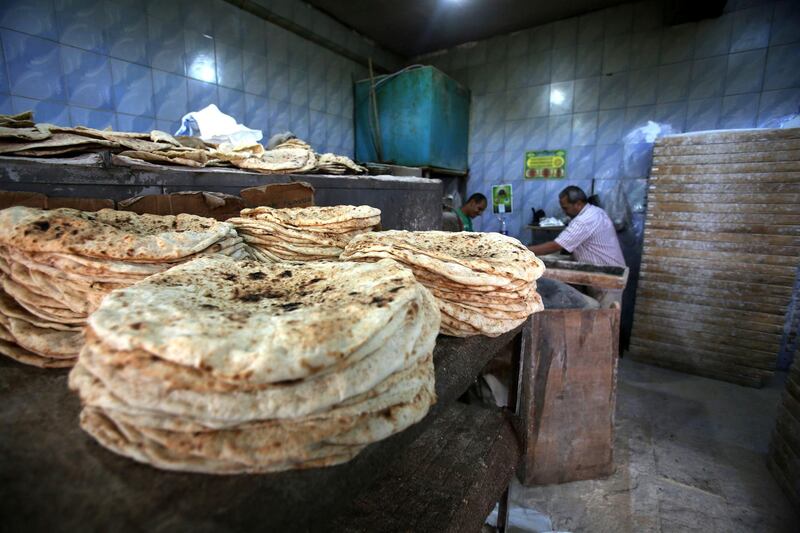Life was already tough for unemployed men in the impoverished Jordanian town of Dhiban. But now, with food and services prices on the rise and the government considering another round of taxes and subsidy cuts, things are getting worse.
Last week, dozens of unemployed men protested near a water dam in the wider Dhiban district, blocking the road and demanding that the coalition of companies awarded a tender to double the dam's capacity make local workers their hiring priority.
"People have protested not because they have political demands, but because they want to improve their living standards. They are starving," said Hussein Samarat, the head of a municipality within Dhiban district.
Mr Samarat said he and other local officials negotiated with company representatives, who said they would look into hiring 70 people from the community.
This represents a small victory for the men of Dhiban, however. With nearly 1,300 men having applied for jobs at the dam, the vast majority will be unsuccessful.
________________
Read more:
[ Jordanians tighten belts as government increases taxes to combat debt ]
[ Jordan’s austerity drive risks fuelling resentment ]
[ Jordanians doubtful of change through ‘milestone’ elections ]
________________
Protests are not uncommon in Jordan, where the current rate of unemployment stands at a record 18 per cent and poverty at 14.4 per cent — although protesters run the risk of being detained if demonstrations turn violent or anti-royal slogans are chanted. And as the government considers another round of austerity measures, including cuts to bread subsidies, analysts warn that such protests could intensify.
“The economic situation may turn into a security threat that could drag the country into chaos,” said Oraib Rantawi, head of Al Quds Centre for Political Studies, a think tank based in Amman.
“People have reached the limit.”
Jordan is proud of the fact that it has so far managed to sidestep the violence that has engulfed the region since the Arab Spring. But concerns over bread prices are intensifying in the south where unemployment is high, and complaints against poverty are growing louder.
Eighty per cent of Jordanians say the economy is their biggest problem, according to polls released last month by the Centre for Strategic Studies at the University of Jordan.
The economy has been hit hard by the interruption of trade from Syria and Iraq because of the conflicts there, the interruption of gas supplies from Egypt caused by extremist attacks on the pipeline running to Jordan, the erosion of foreign grants as countries change their spending priorities, and a refugee influx that is pushing the country's meagre resources to breaking point.
GDP growth for this year is sluggish and is expected to reach only 2.3 per cent — a slight increase of 0.3 percentage points on last year's rate, according to the World Bank. Already, 73 per cent of Jordanian families spend an average of 116 dinars (Dh601) more than they earn every month, and wages have not risen in line with the cost of living.
Since signing a three-year agreement with the IMF last year, the government has been scrambling to find ways to curb spending and generate revenues.
As part of the deal, the kingdom pledged to generate revenues of 450 million dinars this year, according to the government. Next year, it needs to generate revenues of 520m dinars, and in 2019, 570m dinars. It must also cut public debt to 77 per cent of GDP by 2021.
The government has defended possible plans to cut bread subsidies, arguing other nationalities — including Syrian and Iraqi refugees — are unfairly benefiting from a scheme that costs the country 140m dinars a year. But it says it also plans to provide cash assistance to the poor to mitigate the impact of rising prices.
Prime minister Hani Mulki said subsidies in this year’s budget cost the country between 800m and 850m dinars.
“No country in the world subsidises bread,” he was quoted as saying by the government news agency, Petra. “A good percentage of this subsidy goes to non-Jordanians which is a waste, particularly that the government pays for it in hard currency.”
But such justification provides little comfort for the people of Dhiban.
“If bread prices increase, it will be as if people are buying chicken,” said Oday Deif Allah, 23, who works part-time at a bakery in Dhiban. “People are buying bread in debt, and those who are unable to pay their debt at the end of the month outnumber those who can.”
At a grocery in the town, which lies around 70 kilometres south of Amman, owner Anas Al Qatami, 30, said locals now start buying their groceries in debt at the end of the month, after receiving their salaries.
“You would think that people would start buying groceries in debt 10 days after they receive their salaries, but the debt starts at the end of the month, which means that their salaries do not last them [even] a few days,” he said.
“Many are not settling their debts and this affects my business since I cannot buy goods in debt. All the prices are up, but the salaries have not risen.”
It remains unclear how Jordanians will react if the government does cut bread subsidies. But resentment is already building up.
“We can’t find jobs, there are no projects here," said unemployed Dhiban resident Ahmad Rawajfeh, 24. “Too much pressure leads to an explosion.”
In a rare move, a group named Fursan Al Sharq, which represents members of Jordanian tribes, retired and working members of the military, security personnel, politicians and union members, recently released a statement which, among other things, criticised the royal family for travel expenses it said eat up a big chunk of the budget deficit.
Back in Dhiban, unemployed Firas Qatami said Jordan faced a "bread revolution" if bread prices increased.
Moments later, however, he seemed to change his mind.
“People are afraid," he added. "They will not do anything. The fear factor is still there.”





